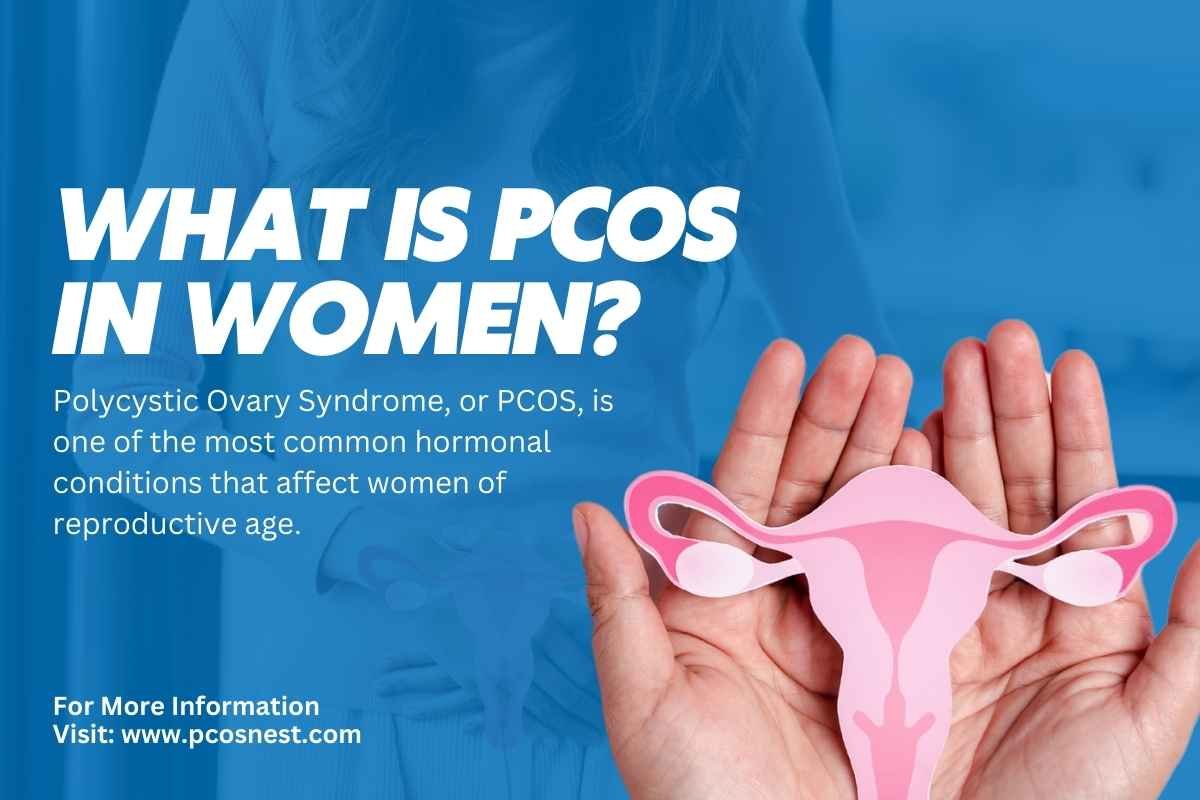What is PCOS | The General Overview
Polycystic Ovary Syndrome (PCOS), is one of the most common hormonal conditions that affect women of reproductive age. There are multiple symptoms of PCOS when your body doesn’t function properly as it should. If you experience irregular periods, weight gain for no reason, or have acne for a long time, PCOS could be the reason.
Also Read: What Causes PCOS in Women?

Hormonal Disruption & Irregular Ovulation:
In essence, PCOS means a disruption of your hormonal system. Women with PCOS may also produce higher levels of male hormones known as androgens, which can lead to issues like excessive hair growth called hirsutism, acne, and hair loss.
Along with these hormone changes, your body might also struggle to ovulate regularly, which results in irregular ovulation. Irregular ovulation means periods are often unpredictable, and sometimes they stop completely. It’s just like a traffic jam within your ovaries; the eggs don’t get the signal to come out for ovulation. This is where the term “polycystic” comes from small, immature follicles (cysts) line up on the ovaries without completing the process.
Insulin Resistance:
But it’s not just about periods. One of the sneakiest effects of PCOS is insulin resistance. Normally, insulin enables the body to break down glucose to produce energy. With insulin resistance, your cells don’t respond well to insulin, so the body increases insulin production. This extra insulin causes the ovaries to produce even more androgens, which causes PCOS symptoms to get worse. Due to this you might notice sudden weight gain, especially around the belly, or feel tired and lazy. It’s like your body’s thermostat for sugar is disturbed.
Impact on Fertility:
PCOS doesn’t only affect your skin and periods. It can also make it difficult to get pregnant. And mostly PCOS is discovered when women try to conceive. While PCOS can impact fertility, it doesn’t mean pregnancy is impossible. Many women with PCOS give birth to children naturally, but sometimes there is a need for fertility treatments.
Also Read: Can You Get Pregnant With PCOS without Treatment?
Health Risks:
And if that isn’t enough, if PCOS is not treated it can lead to other health problems. Over time, insulin resistance can increase the chances of type 2 diabetes or heart disease. The risk of endometrial cancer also rises, because, without regular ovulation, the lining of the uterus wall thickens, which causes cancer cells to grow.
While there’s no permanent cure for PCOS, you can control the symptoms by making good changes to your lifestyle, especially by focusing on weight management. For example, many women find that even losing a little bit of weight helps in the regulation of their periods.
PCOS & Mental Health:
PCOS can also affect your mental health. Dealing with weight gain, acne, and unwanted hair growth can hurt your confidence. If you get worried about getting pregnant or long-term health risks, it’s no surprise that anxiety and depression are common for women with PCOS. But don’t worry, there’s hope. With the right treatments and support, most women with PCOS can live happy, healthy lives.

Reference Books:
PCOS: The Dietitian’s Guide by Angela Grassi and Stephanie Mattei.
PCOS SOS: A Gynecologist’s Lifeline To Naturally Restore Your Rhythms, Hormones, and Happiness by Alexis Perella and Felice Gersh.
Learn more about PCOS on Wikipedia
Frequently Asked Questions about PCOS:
Is PCOS Curable?
PCOS is not curable but its symptoms can be effectively controlled through appropriate treatment and lifestyle changes.
Is PCOS an autoimmune disease?
No, PCOS (Polycystic Ovary Syndrome) is not an autoimmune disease. It is a hormonal disorder characterized by irregular menstrual cycles, excess androgen (male hormone) levels, and ovarian cysts.
Does PCOS only affect overweight women?
No, women of any weight can have PCOS, although it is more common in those women who are overweight.
What causes PCOS?
The exact cause is unknown, but factors like genetics, insulin resistance, and inflammation may cause PCOS.
Can PCOS symptoms improve after menopause?
Some symptoms, like irregular periods, may improve, but other issues like insulin resistance and the risk of heart disease may persist.
How does diet affect PCOS?
A diet that is low in refined carbs and sugars, can help to manage insulin levels and reduce symptoms.

